Jacksonville is Florida‘s largest city with nearly 1 million people and is the biggest city by size in the continental United States.
It is at about the center of alligator county.
Alligators also like rivers, and the city has the St. Johns River running through it.
It has all the conditions to have alligators.
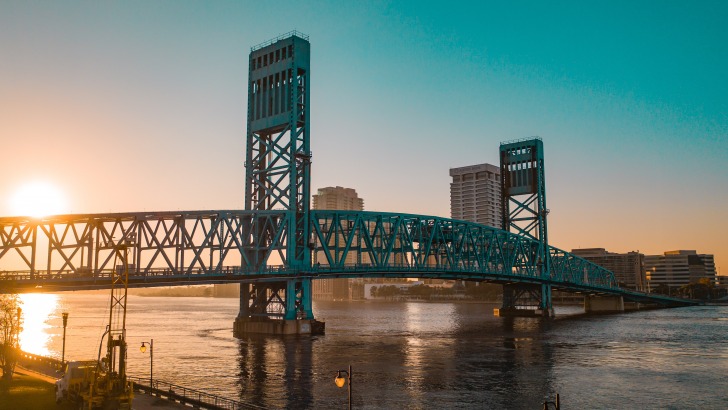
Contents
So… Are There Alligators in Jacksonville?
There are a lot of alligators in Florida, and Jacksonville no doubt has some alligators living within the city limits.
Most big cities don’t have them in the city limits, but Jacksonville takes in a lot of space beyond urban areas.
A study of the tributaries of St. Johns River by the University of North Florida found 93 alligators in nine tributaries.
It stands to reason there are a lot more that they did not see, so there are definitely alligators living in the wild within the city limits.
There are an estimated 1.25 million adult alligators in Florida, and while many may be in the southern part of the state, it should be no surprise that Jacksonville would have its share.
The study noted a lack of big alligators in those areas and attributed that to hunting and taking of the bigger, older alligators.
It is surprising to most people when an alligator is spotted on the streets, or on a golf course in Jacksonville, but it is something people who live there are accustomed to.
In 2021, an alligator was found hiding under a truck on a highway that parallels the beach.
There have been 410 unprovoked alligator bites requiring medical attention to Florida residents since 1940, and 25 people have been killed.
Those are statewide numbers, but some were in Jacksonville.
You can spot alligators in the wild without much difficulty, and there are several places with captive alligators that you can see.
Alligator Species in Jacksonville
Alligators in the Jacksonville, FL area are American Alligators, a species that lives in coastal areas from Texas to Virginia.
These alligators prefer marshes, swamps, and wetter areas.
The only other species of alligator lives in China.
Alligators are part of the Crocodilian family, but there are several species of crocodile.
There are no crocodiles that we know of in Jacksonville.
Is it Safe to Swim in Jacksonville?
It is generally safe to swim in the waters around Jacksonville, but there are plenty of dangers to be aware of.
If you follow regular precautions and keep your eyes open, you should not have any trouble.
Jacksonville has a lot of options for swimming.
There is the St. Johns River, the ocean, and some lakes around.
Each one is different and each has its own advantages and dangers.
There are several beaches in the area with many amenities, as well as areas marked for swimming that have lifeguards.
The river is generally fine as long as you don’t go too far out.
The current under the surface can be swift and can get you in trouble.
If you go far upriver enough you will encounter alligators, so care needs to be taken.
Don’t get in the water if you see alligators.
There are also things you cannot see under the water that could be dangerous.
Alligators also frequent lakes in the area.
There are also a lot of beaches around Jacksonville, and they are generally safe as well.
There are areas marked for swimming and that is where you should swim.
Alligators don’t like salt water, so you are not too likely to see one on the beach.
There are jellyfish, stingrays, and other creatures that can bite you in the surf, so it is good to keep your eyes open.
There can also be rip tides or currents in the ocean that can get you in trouble.
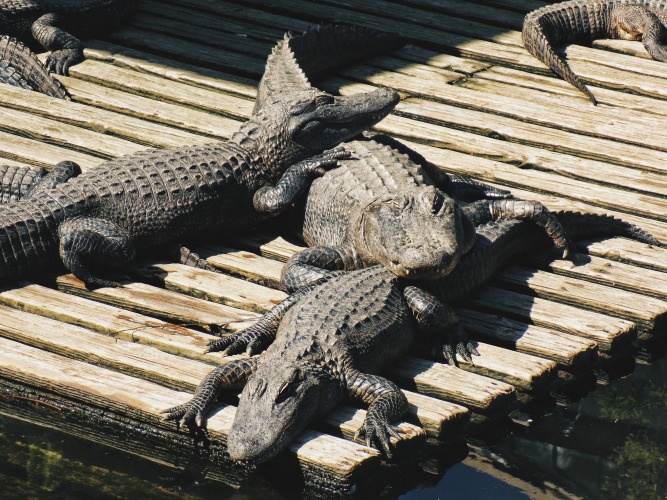
Interesting Alligator Facts in Jacksonville
A study by a university found a lot of smaller alligators in tributaries of the St Johns River in Jacksonville.
This means there are not many adult alligators.
The study attributed that to the larger ones being taken out by hunters.
Jacksonville wildlife officials will remove any alligator longer than four-feet long.
They try to capture it and take it back to the wild, but sometimes it is killed.
Those under that length are not considered nuisances legally.
Alligators are mostly found in ponds.
They are often seen on golf courses because there are usually several ponds in the area.
It is still rare to see one in a residential area, but it does happen.
April through June is the mating season, and when alligators are most active and most aggressive.
Mother alligators will fiercely defend their young, so it is dangerous to be around one.
If you see baby alligators, you should avoid that area.
When the water temperature goes below 55, alligators go into a state of brumation, or hibernation.
They do not eat or move much in that state.
When the weather warms up they come out of that state.
Alligators can stick their snouts through ice and breathe even if they are in brumation and the weather is very cold.
Jacksonville averages 16 days below freezing each year, so there are not many days that alligators are not at least somewhat active there.
Florida has more than a fifth of the five million alligators estimated to live in the United States.
Only Louisiana has more.
Florida has just over 1 million of them.
Alligators vs. Crocodiles
There are alligators in every county in Florida, but only the southernmost county in the state has crocodiles.
South Florida is the only place where alligators and crocodiles live together, but there are no crocodiles this far north.
Both are in the crocodilian family, and they are related but have some significant differences.
Alligators can get up to 1,000 pounds and are 12 feet long, but most are around 800 pounds.
Crocodiles are about twice the size of alligators and can weigh 2,000 pounds and grow to 20 feet long.
The size may be part of the reason crocodiles have such a powerful bite.
The crocodile has the strongest bite of any creature in the world and can bite with the force of 4,000 pounds per square inch.
Alligators are no slouch though and can bite at about 3,000 pounds per square inch.
To put that in perspective, a strong human bite would be around 160 pounds per square inch.
Their heads are shaped differently as well.
Crocodiles have a more pointed nose, and their teeth are visible when they close their mouth.
Gators have a more rounded snout and their teeth are hidden when the mouth is closed.
Crocodiles have a set of 66 teeth, while alligators’ teeth seem less organized and there are about 80 of them.
Both grow new teeth when the teeth are worn down or lost.
Alligators are black or gray, while crocodiles are tan or green.
Both have a lighter underbelly.
Alligators have webbed feet, which makes them better swimmers.
Crocodiles do not have webbed feet and are more comfortable on land.
Alligators live near the coast but prefer fresh water and do not tolerate salt water well.
Crocodiles are fine in either environment.
3 Safety Tips for Swiming in Alligator-infested Waters
There are alligators in the Jacksonville area, but it is not that often you see one while swimming.
They don’t like the beach and tend to stay away from crowds as much as possible.
Still, there are dangers in the area.
Here are three safety tips:
- Watch for alligators. Keep aware of your surroundings while you are swimming. If you do see an alligator, don’t go into the water if they are in the water. They like to hang out in ponds or relatively slow-moving water. Alligators are great swimmers. They can also move fast for a short distance on the ground. It’s best to keep your distance. Wildlife officials recommend at least 50 feet. If they are lying on the bank of a river, you are probably safe if you are 50 feet away.
- Don’t swim alone or at night. You never know when an accident will happen or when you will get in trouble. It is good to have a friend with you just in case something happens. You will also be there for the other person. Being alone in the water makes you more vulnerable to all sorts of dangers. At night is when alligators, and other wildlife, look for food. They are more active and more dangerous then. Also, at night, you cannot see well enough to avoid dangers that may be in the water.
- Swim in designated areas. Local experts pick out areas that are safe for swimming. Other areas may also be safe, but they have not been checked out, and those areas are where accidents are more likely to happen. If there is a warning, heed the warning. Avoid swimming during storms. Warnings are posted on beaches when there is storm activity that could be a danger.
Summary
Jacksonville has plenty of alligators, but they mostly stay away from crowds and prefer rivers or ponds.
They show up at times on golf courses or public waterways.
Jacksonville takes in a lot of areas.
It has St. Johns River, and a lot of ponds and lakes, all of which are areas that alligators like.
Jacksonville Safety Overview
READ THE FULL REPORT: Jacksonville Safety Review
Safety Index:
- OVERALL RISK: MEDIUM
- TRANSPORT & TAXIS RISK: LOW
- PICKPOCKETS RISK: LOW
- NATURAL DISASTERS RISK: MEDIUM
- MUGGING RISK: MEDIUM
- TERRORISM RISK: MEDIUM
- SCAMS RISK: LOW
- WOMEN TRAVELERS RISK: MEDIUM
Frequently Asked Questions
Why is it a bad thing to feed alligators?
Feeding them makes them associate people with food, and they will start expecting it when they see a person.
This makes them more aggressive and more willing to approach people.
Also avoid throwing fish scraps in the water when you clean your fish, as this, in essence, is also feeding the alligators.
It is best not to interact with alligators in any way.
How likely are you to be killed by an alligator?
Surprisingly perhaps, the alligator is not even close to the most dangerous animal out there.
From 1999 to 2007, there were nine people killed by alligators or crocodiles in the United States.
In that same time period, 655 were killed by cows or horses, and 509 died from an allergic reaction to bee stings.
According to scientists, even for people living in Florida, your chances of being killed or seriously injured by an alligator is one in 2.4 million.
Are alligators endangered?
They are not now, but they used to be.
In the late 60s, they were almost extinct because of overhunting and were put on the endangered species list.
In the early 80s, their population had recovered to the point that they were no longer endangered.
As their population grew, even more, states started allowing alligator hunting.
Florida started its hunting season in 1988.
Can you hunt alligators in Florida?
Alligator hunting season is from August 15 through the end of October each year.
Hunting license applicants are given a set number of tags and have to take each alligator they take.
The state is trying to manage the population through hunts.
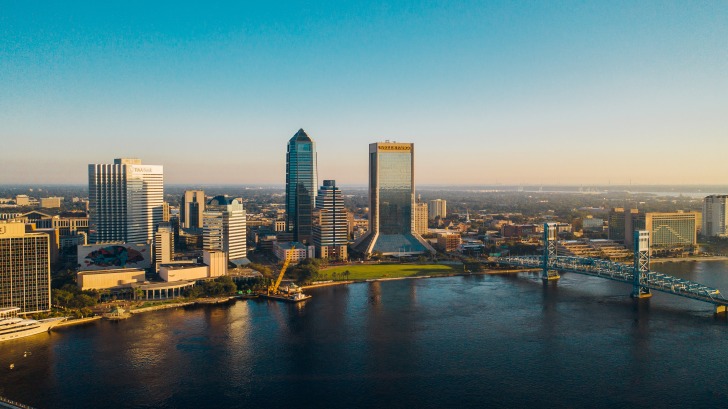
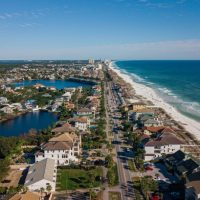



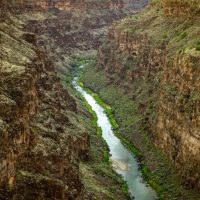
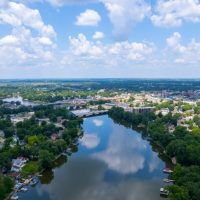





Alligators are not the only danger in Jacksonville waters, but they are probably the most dangerous.
They can be avoided by following some simple rules and using common sense.
Jacksonville has a significant alligator population due to its location near rivers and wetlands, making it important for residents and visitors to take precautions while swimming or exploring outdoor areas.
It is not surprising that there are alligators in Jacksonville, but it may be a surprise to see one on the street or at your front door.
Alligators can live up to 50 years and grow over 12 feet long.
There are definitely alligators in Jacksonville, Florida, but they tend to stay away from crowded areas and prefer rivers or ponds.